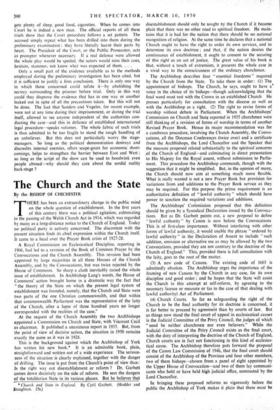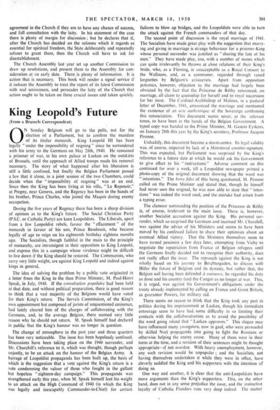The Church and the State
By the BISHOP OF CHICHESTER
THERE has been an extraordinary change in the public mind on the whole question of establishment. In the first years of this century there was a political agitation, culminating in the passing of the Welsh Church Act in 1914, which was regarded by many as a long-distance notice to the Church of England. Today
no political party is actively concerned. The discontent with the present situation finds its chief expression within the Church itself. It came to a head over the Prayer Book crisis of 1927-28.
A Royal Commission on Ecclesiastical Discipline, reporting in 1906, had led to a revision of the Book of Common Prayer by .the Convocations and the Church Assembly. This revision had been approved by large majorities in all three Houses of the Church Assembly, and by the Convocations, but was twice rejected by the House of Commons. So sharp a clash inevitably raised the whole issue of establishment. In Archbishop Lang's words, the House of Commons' action brought home in a dramatic way the fact that
"the theory of the State on which the present legal system of
establishment was founded, namely, that the Church and State were two parts of the one Christian commonwealth, and that within that commonwealth Parliament was the representative of the laity of the Church, after a lapse of three hundred years no longer corresponded with the realities of the case."
At the request of the Church Assembly the two Archbishops appointed a Commission on Church and State, with Viscount Cecil as chairman. It published a unanimous report in 1935. But, from the point of view of decisive action, the situation in 1950 remains exactly the same as it was in 1928.
This is the background against which the Archbishop of York has written his new book.* It is an admirable book, plain,
straightforward and written out of a wide experience. The serious- ness of the situation is clearly explained, together with the danger of drifting. The issue is put from the Church's point of view thus: Is the right way out disestablishment or reform ? Dr. Garbett comes down decisively on the side of reform. He sees the dangers of the totalitarian State in its various phases. But he believes that * Church and Stare in England. By Cyril Garbett. (Hodder and Stoughton. 150
disestablishment should only be sought by the Church if it became plain that there was no other road to spiritual freedom. He main- tains that it is bad for the nation that there should be no national recognition of religion. At the same time he declares that a national Church ought to have the right to order its own services, and to determine its _own doctrine ; and that, if the nation desires the continuance of establishment, it ought to consent to the securing of this right as an act of justice. The great value of his book is that, without a touch of extremism, it presents the whole case in a vivid way to the consciousness of the ordinary churchman.
The Archbishop describes four "essential freedoms" required by the Church from the State. To take them in order: (1) The appointment of bishops. The Church, he says, ought to have a.
voice in the choice of its bishops—though acknowledging that the final word must rest with the Crown in an established Church He presses particularly for consultation with the diocese as well as with the Archbishop as a right. (2) The right to revise forms of worship without debate in Parliament. When the Archbishops' Commission on Church and State reported in 1935 churchmen were
still thinking of .a revision of forms of worship in terms of another Revised Prayer Book. Hence its major recommendation was for
a cumbrous procedure, involving the Church Assembly, the Convo-
cations, all the Diocesan Conferences (twice over) and a certificate from the Archbishops, the Lord Chancellor and the Speaker that
the measure proposed related substantially to the spiritual'concerns .of the Church of England—and culminating in direct presentation to His Majesty for the Royal assent, without submission to Parlia- ment. This procedure the Archbishop commends, though with the suggestion that it might be simplified. But, in the opinion of many, the Church should now aim at something much more flexible.
What is really wanted is not a new Prayer Book but provision for variations from and additions to the Prayer Book service as they may be required. For this purpose the prime requirement is an authoritative definition of "lawful authority" which should have power to sanction the required variations and additions.
The Archbishops' Coririmission proposed that this definition should be given by a Synodical Declaration issued by the Convoca- tions. But as Dr. Garbett points out, a new proposal to define "lawful authority" by Canon is now before the Convocations This is of first-class importance. Without interfering with other forms of lawful authority, it would enable the phrase "ordered by lawful authority" in the Declaration of Assent to include "such addition, omission or alternative use as may be allowed by the two Convocations, provided they are not contrary to the doctrine of the Church of England." This, provided there is full consultation with the laity, goes to the root of the matter.
(3) A new code of Canons. The existing code of 1603 is admittedly obsolete. The Archbishop urges the importance of the framing of new Canons by the Church in any case, for its own discipline and good order ; and he hopes that the State will assist the Church in this attempt at self-reform, by agreeing to the necessary licence or measure or (as in the case of that dealing with lawful authority) Act of Parliament.
(4) Church Courts. So far as safeguarding the right of the Church to be the final authority for its doctrine is concerned, it is far better to proceed by agreement than by courts of law. But as things now stand the final court of appeal in ecclesiastical causes is the Judicial Committee of the Privy Council, the judges of which "need be neither churchmen nor even believers." While the Judicial Committee of the Privy „Council exists as the final court, with the duty of interpreting the doctrine of the Church of England, Church courts are in fact not functioning in this kind of ecclesias- tical cause. The Archbishop therefore puts forward the proposal of the Canon Law Commission of 1946, that the final court should consist of the Archbishop of the Province and four other members, two of them bishops—chosen from a panel of eight appointed by the Upper House of Convocation—and two of them lay communi- cants who hold or have held high judicial office, nominated by the Lord Chancellor.
In bringing these proposed reforms so vigorously before the public the Archbishop of York makes it plain that there must be agreement in the Chtirch if they are to have any chance of success, and full consultation with the laity. In his statement of the case there is plenty of margin for discussion ; but he declares that if, after the Church has decided on the reforms which it regards as essential for spiritual freedom, the State deliberately and repeatedly refuses to grant them, then the Church will have to ask for disestablishment.
The Church Assembly last year set up another Commission to draw up resolutions, and present them to the Assembly for con- sideration at an early date. There is plenty of information. It is action that is necessary. This book will render a signal service if it induces the Assembly to treat the report of its latest Commission with real seriousness, and persuades the laity of the Church that action ought to be taken on these crucial issues and taken quickly.



































 Previous page
Previous page